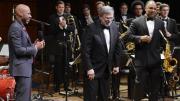Appropriately enough, an evening of superb jazz on Saturday, April 13, formed the final Harvard tribute to Tom Everett, who retired this year as director of the Harvard University Bands after a sterling career at their helm that began in 1971. One of the most beloved figures on campus, Everett drew a packed house to Sanders Theatre for the concert, produced by the Office for the Arts, that featured a wide variety of jazz modalities—a fitting acknowledgment of Everett’s own wide-ranging musical tastes. (An accomplished trombonist, Everett has performed professionally in both classical and jazz contexts.) Nearly all the performers were either current Harvard students or alumni of the Harvard University Jazz Bands, which came into being under Everett.
The evening opened with Benny Carter’s Doozy, performed by the Sunday Jazz Band, a 17-player group that is one of several jazz ensembles Everett launched. Next came the Monday Jazz Band, a combo of similar size and many of the same musicians, conducted by Don Braden ’85 who served as the evening’s unofficial emcee. Braden, an accomplished tenor saxophonist, has been in residence this year as guest director of that ensemble. Their first selection, a recent Braden composition, was For-Ever-ett, inspired by Charles Mingus, whose work Everett regularly performed with the Harvard jazz bands—named by Braden, of course, for the guest of honor.
Soon, the overhead screen lowered and the audience viewed a short film on Everett, beginning with an accolade from Harvard president Drew Gilpin Faust, who concluded her account of Everett’s Harvard career with a jazzy send-off: “and of course, he is one bad cat.” There were clips of some of the many jazz artists Everett has brought to campus in association with the Office for the Arts, such as Benny Carter himself and Illinois Jacquet; at Everett’s urging, those with extraordinary records of lifelong accomplishment were designated “Harvard University Jazz Masters in Residence.”
Everett himself chose some of the evening’s pieces, including Second Line by Duke Ellington and Body and Soul by Johnny Green ’28, sung with a soulful lilt by Samara Oster ’13. Braden picked up his sax to solo with the band on his own composition, the spirited High Rise.
After an intermission, saxophonist Joshua Redman ’91 joined the proceedings, and led off with one of his own pieces, Home Fries. He later joined with pianist Aaron Goldberg ’96, bassist Ron Mahdi, and drummer Yoron Israel to form a quartet that played an evocative version of John Coltrane’s Wise One, a title that, in Redman’s words, could be applied to Everett.
The evening concluded with Sonny Rollins’s 1955 composition St. Thomas, a jazz standard with a Caribbean vibe that derives from the Virgin Islands, where Rollins’s mother was born. For this concert, though, the performers reinterpreted the title to thank their own “St. Thomas,” Tom Everett. Braden invited Everett onstage to join the group, along with all Harvard University Jazz Band alumni in the audience. Dozens of the latter came up to shake Everett’s hand in a kind of reception line. Everett received maracas to shake during a high-energy performance of the rollicking calypso tune. Oster sang a set of lyrics customized for Everett and the occasion, and the instrumental side climaxed with Redman and Braden trading sax solos in the classic jazz pattern of ever-shorter bursts: 16-bar, eight-bar, four-bar, then two and one-bar riffs. Everyone onstage without an instrument sang the final chorus, as the audience joined in: “Forty years/of jazz and cheers/Thank you, thank you/our St. Thomas.” In fact, Everett’s Harvard career stretched across 42 years, from 1971 to 2013, but 40 years is, well, close enough for jazz.









